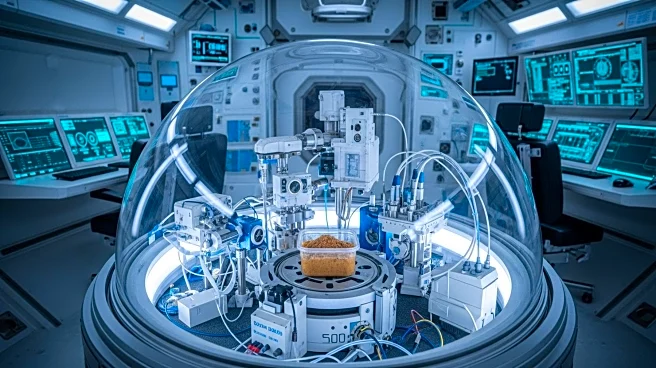What's Happening?
NASA astronauts aboard the International Space Station (ISS) are conducting experiments to enhance crew nutrition through the fermentation of miso and kefir. Expedition 73 flight engineer Mike Fincke is leading the BioNutrients-3 experiment, which involves using a research incubator to test the production of additional vitamins and nutrients from yeast, yogurt, and kefir. This initiative aims to improve the health of future space crews by providing them with essential nutrients during long-duration missions. The experiment is part of a broader effort to study the biological effects of space travel, including the impact of deep space radiation and microgravity on human cells. The research also explores how space conditions activate certain genes in astronauts' DNA, potentially accelerating aging and affecting cellular regeneration.
Why It's Important?
The fermentation experiments on the ISS are crucial for advancing space exploration by addressing the nutritional needs of astronauts on long missions. As NASA prepares for future missions to the Moon and Mars, ensuring that astronauts have access to essential nutrients is vital for their health and performance. The ability to produce vitamins and nutrients in space could reduce the dependency on Earth-supplied food, making missions more sustainable. Additionally, understanding the biological effects of space travel can help mitigate health risks associated with prolonged exposure to space conditions, such as bone density loss and vision changes. This research not only benefits space missions but also has potential applications on Earth, particularly in improving food preservation and nutrition.
What's Next?
The findings from the BioNutrients-3 experiment will inform future space missions, including NASA's Artemis II mission, which will further study the effects of space travel on human health. The results could lead to the development of new technologies for nutrient production in space, enhancing the sustainability of long-term missions. As the ISS continues to serve as a platform for scientific research, additional experiments will likely be conducted to explore other aspects of human health in space. The knowledge gained from these studies will be critical for planning and executing future missions to distant destinations like Mars.
Beyond the Headlines
The research on the ISS highlights the intersection of space exploration and biotechnology, showcasing how advancements in one field can drive innovation in another. The ability to ferment food in space could lead to new methods of food production and preservation on Earth, particularly in areas with limited resources. Moreover, the study of gene activation in space could provide insights into aging and regenerative medicine, potentially leading to breakthroughs in healthcare. As space agencies and private companies continue to push the boundaries of space exploration, collaborations in scientific research will be essential for overcoming the challenges of living and working in space.











